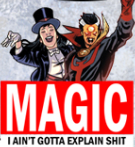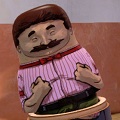|
(accidental doublepost)
Solitair fucked around with this message at 03:35 on Aug 30, 2018 |
|
|
|

|
| # ? May 25, 2024 18:33 |
|
I think The Dark Forest is the weakest book in Cixin's trilogy and it's the only one that isn't translated by Ken Liu. Coincidence?mllaneza posted:Three-Body Problem is a favorite controversy in this thread; I think consensus is that it's really good, but kinda weird and not for everybody. Definitely check it out, it has ideas and assumptions very different from Western SF. I also like Cixin Liu's short stories, he has a hell of an imagination. Edit: I read the Wandering Earth collection and I didn't enjoy it very much at all, at least not the way I think Liu intended. This seems to be another translation issue, because after the first or second story I found it very hard to take any of them seriously. Everything just feels so cartoonish and bonkers in those stories (especially "Curse 5.0," in which Liu himself gets drunk and kickstarts an apocalypse, then bemoans how often he wrote about apocalypses in his fiction), whereas the Three Body Problem trilogy does a good job of building up a mood of dread and helplessness (though it also got ridiculous once or twice, especially when it homages "Curse 5.0").
|
|
|
|
I thought the two Dandelion Dynasty books were a fairly typical Game of Thrones style "grounded" politics-war fantasy series with a Romance of the Three Kingdoms gloss (or in this case, lacquer) applied to it, and I found them quite bland overall. The second book had inconsistent characterization with the first (the emperor wants his daughter to be his heir but basically does nothing to prepare her, one of his wives suddenly turns evil), cartoonishly evil mongols with dragon aircraft carriers, and I have issues with how it treats a LGBT character. basically the princess and woman engineer fall in love near the end of the book, and then a few chapters later she gets married off to a guy, felt like one of those old books where The Gays aren't allowed happy endings. Also anybody saying it's Wuxia is likely misusing the term because I don't recall either of the books having people launching themselves through the air to have Crouching Tiger style sword fights and so on. If anything they fall more into the realm of near-steampunk because by the second book people are using human-powered submarines and airships with lightning guns. I found the whole "submarines vs aircraft carriers" bit in the second book to read like the fantasy version of some Baen milSF novel where the protagonist reinvents some old-Earth military tactic and DISRUPTS traditional military thinking. (eg, Honor Harrington reinventing aircraft carriers in space right around the time I quit the series) Apologies if I'm incorrect on any details, I read them a a while back and as one can hazard from the above I haven't been inclined to remember specifics. Now additionally on the topic of Wuxia, the first Legend of Condor Heroes was finally (officially) translated into English earlier this year. I have heard there are some issues with the translation, but apparently it's mainly incorrect/strange name translation choices rather than the overall quality.
|
|
|
mllaneza posted:Three-Body Problem is a favorite controversy in this thread; I think consensus is that it's really good, but kinda weird and not for everybody. Definitely check it out, it has ideas and assumptions very different from Western SF. I also like Cixin Liu's short stories, he has a hell of an imagination. I'm about halfway through Three-Body Problem and finding it hard to finish. I want to like it a lot, but maaan if it isn't a heavy book (in the sense that it's a loving doooowner to read). I came into it hoping for some kind of perspective that I'm not used to from Anglo-American sci-fi, and while it does deliver on that I guess, it's also depressing as hell to read about scientists going crazy and killing themselves because the laws of science suddenly no longer exist.
|
|
|
|
|
ulmont posted:This was written right around the time of Zahn's trilogy, so before the SWEU really became a thing. More to the point, though, if you're looking for "a setting that mixes high tech and high magic", it's going to look a lot like Star Wars. ...not necessarily? Starship's Mage doesn't, neither do the Warlock books or Glen Cook's Darkwar. Not at the political level or the mechanical level. I'm also not sure I'd call Jedi powers "high magic"; they're generally just small-scale personal telekinesis and whatnot. Compare to (e.g.) Starship's Mage, where magic is used for (among other things) FTL travel and communications, artificial gravity, antimatter production, and last-ditch point defence, and is the preferred and deadliest weapon for close range (<5 light-seconds or so) ship to ship combat. And before the start of the series, it was used to terraform Mars. ToxicFrog fucked around with this message at 12:41 on Aug 29, 2018 |
|
|
|
ToxicFrog posted:Just finished Glynn Stewart's Starship's Mage series. It's unexceptional but enjoyable space opera with a nice mix of deep space fleet actions, ground combat, and political intrigue, which I know some people earlier in the thread were looking for. It's also a setting that mixes high tech and high magic, which is pretty rare and something I'd like to see more of. I might of talked about this in the trench. But, Glynn Stewart is one of my more preferred vomits a book every other month and writes campy space opera stuff authors. He is also incrementally improving overtime, the works are definitely indie, and I havn't had a single one make me go WOAHHH AWESOME, but they fill the space between better books decently enough. If amazon recommends Wizard Scout Chronicles like it did for me after liking Starship Mage do not read. The prose was bad enough...that I someone who can stand to read MTLs struggled, the characters were so stupid it was infuriating, and the plot was...okay moderately interesting but not good enough to make up for the rest.
|
|
|
|
ShinsoBEAM! posted:I might of talked about this in the trench. But, Glynn Stewart is one of my more preferred vomits a book every other month and writes campy space opera stuff authors. He is also incrementally improving overtime, the works are definitely indie, and I havn't had a single one make me go WOAHHH AWESOME, but they fill the space between better books decently enough. Yeah, none of them were books I loved and would go out of my way to recommend to others on the flimsiest of pretexts like (say) Long Way, but I enjoyed them and I'll probably check out some of his other stuff next time I'm in a space-operatic mood. I think I originally got the recommendation from this thread, so, thanks whoever that was.
|
|
|
|
It may interest anyone who follows the Hugos to know that Kickstarted In The Butt: A Chuck Tingle Digital Adventure is funding right now.
|
|
|
|
wiegieman posted:I will readily admit that I was halfway through Son of a Liche before I got the joke about the Head of Marketing. Did not expect those books to be as good as they were, will definitely pick up the third when it comes out.
|
|
|
|
I just finished Foundryside by (former goon) Robert Jackson Bennett and itís pretty good, actually. Magic system as computer operating system and the MC is a bit of a hacker. Itís a trilogy, but RJB did a good job of sticking the ending of his last trilogy so Iím in.
|
|
|
|
Alright, the Andrew Broomfield english translation of Monday begins on Saturday is ok, not great. The forewords between the DAW edition and the Chicago Review Press edition illustrate the differences between the two translations. The 1977 DAW edition forward says "hey these are russian folklore + fairytales set in modern communist russia", while the CRP edition says "hey this is russian Harry Potter, 40 years before the Harry Potter books came out". Broomfield keeps adding extra words and moving around phrasing to differentiate his translation from the 1977 DAW/Leonid Renin english translation. Broomfield also can't resist super twee pun names. Examples follow: N I T W i T vs S R I T S CRP 2017 version https://imgur.com/a/R4LaYjQ DAW 1977 version https://imgur.com/a/fNkIDiO Story 2 "Vanity of Vanities" 1st page CRP 2017 version quote:About two o'clock in the afternoon, when the Aldan's input device blew its fuse again, the phone started to ring. It was the deputy directory for the administration of buildings and contents, Modest Matveevich Kamnoedev. DAW 1977 version https://imgur.com/a/fNkIDiO Story 2 "Vanity of Vanities" 1st page DAW 1977 version quote:About two o'clock in the afternoon, when the input equipment breaker blew again, the telephone rang. Modest Matveevich Kamnoedov, Deputy Director of Administration and Plant, was on the line. quantumfoam fucked around with this message at 05:12 on Aug 30, 2018 |
|
|
|
navyjack posted:I just finished Foundryside by (former goon) Robert Jackson Bennett and itís pretty good, actually. Magic system as computer operating system and the MC is a bit of a hacker. Itís a trilogy, but RJB did a good job of sticking the ending of his last trilogy so Iím in. As someone who really enjoyed Rick Cook's Wizard's Bane series, this sounds like something I should keep an eye on.
|
|
|
|
Finished Andrew Broomfield's english translation of Monday begins on Saturday. Overall, not great but not terrible. My advice is to combine reading Broomfields english translation (more modernized terms) concurrently with the 1977 DAW english translation(for the in-book footnotes which highlight russian folklore + myth that would be unknown to people not specialized in eastern european folklore or that grew up in eastern europe bloc/russian households ). The repetition of going over freshly read pages in a slightly different presentation should improve the overall Monday begins on Saturday experience immensely. Read The Best of Larry Niven collection edited by Jonathan Strahan. The stories in the collection relied more and more on implausible gimmicks, abrupt tonal shifts, outdated science, and Niven's creepy old man fantasies as I read the book. The most original non-science-fact based story in the collection was "The Fourth Profession" that involved a irish pub, a alien on a 3 day drunken bender, instant education career/skills RNA pills, and the fact that the alien traders in the story tend to induce stellar explosions aka Novas in star systems. Niven tried to re-capture the magic of the fourth profession story in a few short stories set in a Spider Robinson-esque bar/space station watering hole, but sadly Niven was in fullblown creepy old fantasy mode for those stories.
|
|
|
|
Anybody read City of Stairs recently? I read it not long ago so I don't really want to reread it, but it was long enough that I forgot some of the finer points of the plot so it'd be great if someone could spoil them for me before I start the next book. My main questions are do we find out what the metal was that the Kaj used to kill the gods? And what was with the God that was, like, trapped in glass or something? And what was the main character's deal? I remember she was related to a god or something but I don't remember the particulars. Bonus points: I remember the pirate sidekick guy had the Finger of Kolkhan on his palm, are we ever told what that is or how he got it?
|
|
|
|
|
I don't remember most of that detail. There's a brief recap here: https://www.reddit.com/r/Fantasy/comments/4deiu1/city_of_stairs_recap/ The final question is elaborated on in book 3.
|
|
|
|
Does the craft series stay the same after book 2? Interesting premise but pretty boring.
|
|
|
|
|
MockingQuantum posted:Anybody read City of Stairs recently? I read it not long ago so I don't really want to reread it, but it was long enough that I forgot some of the finer points of the plot so it'd be great if someone could spoil them for me before I start the next book. I only recall the answer to the first question, which is: It wasn't naturally occurring, the god-killing black metal was actually a Miracle in itself. The Kaj was half-divine because his mother was his family's servant-golem (the one he used for the first test of the god-killers, natch) and not the woman his father had married, so his alchemy to find a material to kill the gods (M)iraculously worked where every other attempt had failed. All this was the secret that the gods told him to destroy him when he launched the final invasion of their demesnes.
|
|
|
|
I just went on a sci-fi binge over the last 2 months and had some very mixed results. I should apologize in advance for the brevity but I want to finish up my backlog. Frankenstein - Mary Shelley I did not expect to like this one but I loved it. It also lead me to believe that a majority of people who paraphrase this work has not actually read it but also that most people who comment on the first group has not done so either The monster is very intelligent and eloquent. The monster murders like 5 innocent people for revenge and spite so people who say "the monster was not the bad guy" are also wrong. From the Earth to the Moon - Jules Verne Jules Verne gets a lot of critique for endlessly drawing out the technical details in works that is all fiction anyway. 30 pages explaining how an aluminium cannon ball with a human inside can be fired to the moon is about as realistic as "a wizard did it" but me personally I loved the part where the gun club guys discuss the cannon in detail and the merits of various metals, elements and explosives. I specially like 19th century sci-fi because there's a certain charm to them romanticizing things we take for granted today. Like transferring words through wires using electricity or portable electric lights. In "From the Earth to the Moon" they use "aluminium" as fantasy writers use "mithril" as this go-to magic metal that can be substituted whenever a leap of imagination is needed. Even though the properties that make aluminium great are also what makes it a horrible material for a cannon ball. A Journey to the Center of the Earth - Jules Verne The characters here are just so charming. I especially like how the main character is drat near useless and spends the whole book being saved by the other characters and that his crackpot uncle turns out to be very competent even though the setup is for him to be this mad scientist. The books portrayal of Iceland as a "here there be dragons" territory is also cute in retrospect Around the World in 80 Days - Jules Verne Something I do struggle with when it comes to Verne is the theme of "rich man uses the power of money and superior birth to save the day" Only later in the book did I realise that Verne is actually taking the piss with his overdone protagonist Phileas Fogg. Passepartout was a great character though, and I enjoyed the book a lot. I'm not going to give Verne crap over the staggering amounts of racism due to how old the works are. 20,000 Leagues Under the Sea - Jules Verne I've been meaning to read this one for years. I again had a hard time with Nemo solving every single problem with the power of money and the tech bought with money. I heard that the translation of this book into English was corrupted though and a lot of Vernes social criticism of British imperialism was taken out by the English translator. That in the original it's hinted a lot that Nemo was an Indian prince of sorts which to me helped round out his character a lot. A character that seemed to be missing a lot of motivation in the English version. Ender's Game universe in timeline order - Orson Scott Card Ender's Game I thought this was terrible. It combined all the things I dislike. Child heroes "chosen one syndrome" where the protagonist by merit of birth is designated to be the hero of all and everyone around him bows to the prophecy. 8 year old children giving 6 year olds the Lee Ermey Full Metal Jacket speech The author also goes into great detail of the soapy bodies of naked children in the shower and "budding" young girls. At the end of the book was a rant by the author on how they were going to make a movie out of this book and how the producers wanted to make the hero 16 years old but the author insisted that the hero had to be 12. Rant after rant about how important it was that all the children be 12 years old or younger or there would be no movie. The plot twist at the end had me go "huh that's sort of neat" but I figured something was up because the book was almost finished and they were still just in training I googled the name of the book to see how many years in prison the author was serving for doing a Subway Jared and to my astonishment the book became a movie but apparently a popular one at that. A War of Gifts some German kids at the space academy for galaxy-brained child soldiers exchange Christmas gifts. This causes the Muslim kids to revolt because religious activities are supposed to be banned. They demand that the school acknowledge Ramadan. I didn't think that I could lose any more respect for the author but there you go. Ender's Shadow Minor character gets his own arc as major story elements from the original book is conspicuously attributed to him after the fact. More galaxy-brained children outwitting adults at every turn. Up to and including a newly born infant that escapes from a research lab and hides himself in a toilet tank Shadow of the Hegemon After having saved the world the galaxy-brained child soldiers return to their home countries and are used for military planning as nations turn on one another. Petra the one notable female galaxy-brained child soldier spends the whole novel as the Olive Oil style prisoner of a psychopath who tortures and sexually abuses her through the entire loving novel until the hero finally rescues her. The novel also explains how Islam after (finally) having abandoned terrorism unites as a single nation. A lot of the book is about Enders bother Peter who it turns out is a good guy. The problem is that the first book went into an unnecessary amount of detail of how he liked to torture animals. This added nothing to the story but did a lot to ruin his character for the rest of the series Shadow Puppets Petra who's one roll in the entire franchise alternates between the hysterical female, Kidnap victim for the hero to rescue and eventually love interest of varying number of protagonists eventually settles down with the hero Julian "Bean" Delphiki. They decide to have children through in vitro fertilization but the villain of 3 novels-and-counting steals the fertilized eggs and the hero spends the entire book chasing the villain around the world to recover them "our babies" is a term used a lot in the book and it ends up with the villain holding the fertilized eggs at gunpoint. I'm starting to suspect the author of a political agenda at this point. There are 4 more books in the franchise but they alternated between "meh" and "okay" None of them feeling offensively bad but not very notable. The last books seeming like the author took LSD and just wrote down everything that came to mind. Neuromancer - William Gibson I didn't get to far into this book before I put it down. I understand that this book is the basis for all modern day cyberpunk, but for me all these tropes have already been done to death in so many games, comics, movies etc so I had a hard time with it. It also contained a (for me) offensively large amount of techno-babble. From page 1 it just force feeds you so many names of objects, towns, people, tech gadgets with elaborate names and it became a bit much for me. Do Androids Dream of Electric Sheep - Philip K Dick I actually expected not to like this one but it was pretty good. The part where the book starts to hint that the protagonist is an android was a real mind gently caress as you (me) the reader tries to reconcile all the details and make sense of them. It does a lot better at explaining the empathy issues of androids and the testing system than the movies did. It made me understand hos vital internal monologues are for characterization. Hyperion - Dan Simmons I didn't get very far. Too cyberpunk for me. I've come to realise that I strongly dislike cyberpunk. The worlds are just too fluid for me. There's no up or down in cyberpunk, too much gene splicing, mind melding, teleporters, wrist mounted stun lasers. It's like the world has no rules to be grounded in and me as a reader is just expected to take too much on faith with too much techno-babble. To me cyberpunk feels like Batman. Every single situation has its own unique tool and problem, much of which is never seen again. The hero catches some villain who then melts through the floor because he has a special melt-through-the-ground gene chip that he got on the black market. But then the hero whips out a laser and burns a hole through the floor and chases after the villain. The villain then fires an electric net at the hero which the hero escapes using special grounded boots and a wrist mounted saw-blade. Repeat to infinity. Childhood's End - Arthur C Clarke Complete loving batshit. Advanced aliens arrive and profess benevolence and help humanity while being very secretive about their actual goals on earth, They intervene here and there to make the world a better place, they ban bullfighting and animal abuse. One notable place they intervene is in South Africa (and get this) They intervene to stop the black population of South Africa from abusing the white minority (this book was written in 1956) The aliens show great interest in books on paranormal activity, which earth intellectuals find odd because at this point all major religions have been debunked by special TVs that let people look back in time to the actual major events like Jesus/Mohammed etc. The plot twist is that all paranormal activity bullshit is 100% true. Weegee boards, sooth saying, reading in tea-leafs, you name it. It's all true and the scientists of earth are looked on with pity as they grew concerned over the atomic bomb when in fact, humanities latent psychic abilities were on the brink of ripping apart the entire solar system. The Moon is a Harsh Mistress - Robert A Heinlein I didn't get very far. Humans live on a moon colony and start a revolution against the abusive earth government. The revolution is modelled after the Russian revolution with Russian named characters holding important positions. They also call one another "comrade" a lot. But what the revolution is about is to bring forth the free market. You see the earth government has a monopoly on the price of things like fuel, water, food and the people aren't allowed to sell at the free market price. A proletariat revolution for the free market. At one point the hero explains that the revolution is pointless and that making due on the moon is easy if you have some wit. When asked to elaborate he says that his family makes due by running their own farm to produce their own food. When asked about water and power he explains that they tunnelled into a government utility line to steal water and power. So his solution to making due is simple. All you need is free infinite power and water. A libertarian solution if ever I saw one. The Forever War - Joe Haldeman The book lays on the war-porn a bit thick. I think it started out well. Soldiers have these suits of power armour that help with all tasks but the book puts a lot of emphasis on how incredibly vulnerable the soldiers are in the suits due to the harsh environments. Making these almost space-marine like people die in droves because they did something as simple as slip and dent the heat vent on the armour. The smartest humans on earth are conscripted to serve in galactic wars but in exchange for one tour of futy they are paid enough money to live on for their rest of their lives on earth. Very quickly the war ends with a wet fart as their spaceship is damaged and the tour is cancelled and the soldiers are sent home with full pay. However before returning the military puts a lot of effort into trying to convince them to sign up for another tour. When this fails they bring in an officer from earth. This officer is a gay man in military uniform who is every part a 70s gay stereotype, manicured nails, lipstick and make-up. He explains that due to space travels time dilation, 20 years have passed on earth and in that time the earth has changed a lot. Due to overpopulation the UN has mandated the "Gay life" People are encouraged to be gay. As a result 30% of the worlds population are now gay. Straight people or "breeders" as they are called are frowned upon but tolerated. At this point I put down the book. Supposedly the whole book is a "brilliant" metaphor for the Vietnam war and soldiers trying to adjust to civilian life but if that's the case then it all went over my head. Old Man's War - John Scalzi I loved this series. I found it amazing. The theme is that when humans turn 75 they can sign up to join the space force basically. This is a massive military force fights all the aliens while defending earth. When people join they are made young again. They serve 2 years (10) and after that can settle on a non-earth planet with their new young body. The story progresses as the hero gets his new young body, boot camp and then military service in space. What I loved was the mature attitude of all the characters. Yeah there's a ton of war porn but the characters are all experienced old people at heart. They have children and grandchildren back on earth. They aren't fighting for fun. They are fighting to defend the world that they came to know in their 75 years of life. They are mature, patient and relatively rational. Characters are defined by their 70+ years on earth, their lives and jobs back home. The Night Land, a Story Retold - James Stoddard and William Hope Hodgson The original is a bit hard to digest for most modern audiences (especially me) but I really liked this version. The setup is really Starship Troopers - Robert A Heinlein I expected an alien splash party extravaganza. Quit half way through after somehow ending up in a very long rant about how the lack of spanking children literally lead to the collapse of society. How instituting spanking of children and then as adults the lashing of criminals restored order and lead to an end to war and peace on earth. The book compares raising human children to house breaking dogs. That if a dog pees on the floor you need to punish in a way the dog understands. That if all you did was lock it in a shed (metaphor for prison/grounding) then the dog won't understand what it did wrong. But if you instead push the dogs nose into the stain and then beat the dog then the dog will associate what it had done to the punishment it received. In the same way children needed to be spanked at home and canned in school and adult criminals needed to be lashed.
|
|
|
|
my dude, why did you read 8 more Card novels after realizing that Card was bad
|
|
|
|
I sincerely hope you pirated Ender's Game amongst all of that public domain Jules Verne because gently caress giving Orson Scott Card even a cent of your money. Would love to hear your thoughts on some H.G. Wells though.
|
|
|
|
|
Hyperion being cyberpunk.  Also, how about actually finishing a book before complaining about it. There are no points for giving up at half time and if you canít force your way through a horrible sci-fi /fantasy book, I question your commitment to the genre. Finally, saying that everything in Neuromancer have been repeated to death by other later authors is like saying the original work has no value. So I guess LotR, lord of light are out as well?
|
|
|
|
Speaking of not finishing books, isn't Neuromancer like... quite short?
|
|
|
|
|
PupsOfWar posted:my dude, why did you read 8 more Card novels after realizing that Card was bad It was in my early phase when I finished everything I started on principle. Drone posted:I sincerely hope you pirated Ender's Game amongst all of that public domain Jules Verne because gently caress giving Orson Scott Card even a cent of your money. Is it against the rules to admit to :warez: or was that just spreading it? Drone posted:Would love to hear your thoughts on some H.G. Wells though. I actually also read "The Time Machine" and "War of the Worlds" but I couldn't think of anything to write about them. I thought they were pretty fine. Not especially envelope pushing but I enjoyed them. I love old Sci-fi. How the aliens in War of the Worlds had potential to conquer the world in their tripods because the biggest thing we had to oppose them were horse drawn mortars and warships. I respect that in The Time Machine, H.G Wells didn't bullshit the reader with techno-babble to make the time machines design seem plausible. It's a time machine and that's all you need to know.
|
|
|
Pyromaniac Ida posted:I love old Sci-fi. Aight, commence Ray Bradbury.
|
|
|
|
|
Cardiac posted:Hyperion being cyberpunk. I got to the part where a hard boiled detective is hired by an AI in a human-robot hybrid body to find the person who killed the robots last body and she chases a person through a system of teleporters as they exchange fire with stun-beams. Edit: Did I just dream that part? It was all pretty crazy to me. Cardiac posted:Also, how about actually finishing a book before complaining about it. There are no points for giving up at half time and if you canít force your way through a horrible sci-fi /fantasy book, I question your commitment to the genre. I am not criticising Cyberpunk. I'm just saying that it's not for me. The problem is on my end. I respect the work but I don't enjoy it. And I didn't enjoy LOTR either. Page after page of song lyrics and people eating. Dragged on forever. Katt fucked around with this message at 18:49 on Aug 31, 2018 |
|
|
|
Pyromaniac Ida posted:I just went on a sci-fi binge over the last 2 months and had some very mixed results. I should apologize in advance for the brevity but I want to finish up my backlog. The emphasis is on that definite article. I would argue the monster is certainly not the bad guy.
|
|
|
|
I remember reading Around the World and 20k Leagues in jr. high and wondering why Fogg and Arronax were supposed to be so great when they would obviously be completely lost without their servants.
|
|
|
|
withak posted:I remember reading Around the World and 20k Leagues in jr. high and wondering why Fogg and Arronax were supposed to be so great when they would obviously be completely lost without their servants. What on earth did Arronax ever do to deserve such loyalty anyway? His servant often offers his own life so Arronax can live and Arronax isn't even paying him at this point. DirtyRobot posted:The emphasis is on that definite article. I would argue the monster is certainly not the bad guy. That the monster was actually guilty really surprised me. Victor assumed the monster was the killer because it was ugly and so of course it was also evil and I spent the whole novel all "Stop being such a prick Victor" and then he was right but he was right by accident. Was the reader supposed to think like that?
|
|
|
|
Pyromaniac Ida posted:I got to the part where a hard boiled detective is hired by an AI in a human-robot hybrid body to find the person who killed the robots last body and she chases a person through a system of teleporters as they exchange fire with stun-beams. Admittedly, it's been a few years since I've (re)read Hyperion, but I don't remember anything particularly cyberpunk about it. Generally, with cyberpunk, it's hallmarks are corrupt, grimy, near future corporatocracy or some similar similar that exploits an underclass. Stories tend to look at these lower classes in opposition to the corporate overlords who have all the money and privilege. Also, lots of tech. But grimy. It's largely fallen out of favor because it's not sci-fi anymore.
|
|
|
Ben Nevis posted:I don't remember most of that detail. There's a brief recap here: https://www.reddit.com/r/Fantasy/comments/4deiu1/city_of_stairs_recap/ Ceebees posted:I only recall the answer to the first question, which is: It wasn't naturally occurring, the god-killing black metal was actually a Miracle in itself. The Kaj was half-divine because his mother was his family's servant-golem (the one he used for the first test of the god-killers, natch) and not the woman his father had married, so his alchemy to find a material to kill the gods (M)iraculously worked where every other attempt had failed. All this was the secret that the gods told him to destroy him when he launched the final invasion of their demesnes. Thanks friends, these jogged my memory enough that I could skim the last couple of chapters to fill in the rest of the blanks.
|
|
|
|
|
I remember reading The Forever War years ago, and the most memorable part of it was a part when, in order for the soldiers to survive extreme G-forces in space travel, they got their abdominal cavities pumped full of shock-resistant fluid so that their internal organs wouldn't get pulverized. That was hardcore in a way that made the ongoing war all the more disquieting. The second most memorable part is the ending where the war ends offscreen, during another period of time dilation while the protagonist is traveling, and the top brass straight up admit that everybody fought and died for nothing. The matter of fact bluntness is what made it memorable for me. Somehow I read through all the gay stuff that pissed you off without it sticking to me that much, but I'm not going to argue in its defense now. I'm also starting to think that the success of Ender's Game relies on people being surprised and impressed with the twist, and young boys identifying with Ender, rather than the book's quality beyond that. If I'm wrong, please correct me, but it seems quite a few people are deciding this book doesn't hold up after all this time, and after Card being a huge homophobic shitheel in public.
|
|
|
|
Solitair posted:I remember reading The Forever War years ago, and the most memorable part of it was a part when, in order for the soldiers to survive extreme G-forces in space travel, they got their abdominal cavities pumped full of shock-resistant fluid so that their internal organs wouldn't get pulverized. That was hardcore in a way that made the ongoing war all the more disquieting. The second most memorable part is the ending where the war ends offscreen, during another period of time dilation while the protagonist is traveling, and the top brass straight up admit that everybody fought and died for nothing. The matter of fact bluntness is what made it memorable for me. Somehow I read through all the gay stuff that pissed you off without it sticking to me that much, but I'm not going to argue in its defense now. The war stuff is disquieting in a way I will probably remember 20 years from now. This weird combination of overwhelming power but also vulnerability and complete disregard for human life.
|
|
|
|
Ben Nevis posted:Admittedly, it's been a few years since I've (re)read Hyperion, but I don't remember anything particularly cyberpunk about it. It's also been a while, but the section with the woman who is pregnant with the robot baby has a lot of those same themes. I think it was technically going for a noir feel, the near future part is because it takes place in the far future. I finished reading Mary Robinette Kowal's Lady Astronaut of Mars duology recently. It's a decent read that I wish was the actual history of the space program.
|
|
|
|
This thread is someplace that would probably know, what's the rights/other issue that results in Lord of Light not being available for Kindle?
|
|
|
DACK FAYDEN posted:This thread is someplace that would probably know, what's the rights/other issue that results in Lord of Light not being available for Kindle? I'm kinda vagu on the details but as I recall it's a children v. Stepmother estate thing.
|
|
|
|
|
Ben Nevis posted:Admittedly, it's been a few years since I've (re)read Hyperion, but I don't remember anything particularly cyberpunk about it. the lady musclecop's tale could be called cyberpunk maybe the sex pervert poet's tale before he fucks off to live in the doomed artist commune - and even after he removes himself from anything aesthetically cyberpunk, it's probably more thematically cyberpunk than the lady musclecop's tale, come to think of it that's one or two out of six I think ultimately the reason I wouldn't call Hyperion cyberpunk is that most of the characters exist far enough out on the periphery of their society that they don't experience the daily attrition of living under that society's ruling institutions their setting does have plenty of cyberpunk elements in it (the WorldWeb government is a corrupt corporatocracy, as you describe) but the protagonists by and large do not have to deal with them daily most of the travelers are...more or less monks, cloistered in one way or another before they stir up trouble cyberpunk meanwhile is sort of an average joe's genre it's about mediating a hundred daily transactions of power, the abrogation of the self over the course of a thousand small compromises and surrenders the protagonists of hyperion do confront their culture's ruling institutions (they're a collection of rebels and heretics after all) but they do so in exigencies, not mundanities - they're all weirdos You could also argue that one of the hallmarks of cyberpunk is that it depicts a sort of globalist hegemonizing monoculture. The WorldWeb might not qualify as this, despite being a hegemonizing entity. One of the WorldWeb's strong suits, as a fictional dystopia, is that it successfully provides its inhabitants with illusions of choice, diversity and divergence, while keeping them yoked to its own expansionist and hegemonizing purposes. It's a thousand worlds and a thousand cultures, all permitted to exist untroubled as long (and only as long) as they do not impede the profits or security of their rulers. In this way it is probably a bit more prescient than your standard cyberpunk dystopia where everything is cold grey concrete and neon. The WorldWeb provides what modern post-worldwar liberalism seeks to provide, with similar murderous underpinnings. It is not interested in conformity of thought, aesthetic, or being. It provides its residents with the resources and affluence to do whatever they want, and is happy to allow them to do whatever they want as long as they don't look too closely at the policy (particularly the equivalent of foreign policy) that sustains this existence. It has an external underclass (primitive alien species, fringe world colonies like the one the diplomat's tale took place on) rather than an internal one. PupsOfWar fucked around with this message at 00:43 on Sep 1, 2018 |
|
|
|
Pyromaniac Ida posted:
This book is one of my favorites of all time. Clarke delivers a pretty straightforward tale with such a bittersweet mix of loss, hope and love. I found the reveal behind the motivations of the Overlords beautiful --the way they took what had to be a devastating realization that their race could never ascend into the Overmind and shepherded other races to realize a potential they could not attain or really understand hit me hard. This was one of the rare books that made sit quietly for some time after finishing just letting the story sink in. It impacted me on a deeply personal level.
|
|
|
|
Proteus Jones posted:Clarke delivers a pretty straightforward tale with such a bittersweet mix of loss, hope and love. I found the reveal behind the motivations of the Overlords beautiful --the way they took what had to be a devastating realization that their race could never ascend into the Overmind and shepherded other races to realize a potential they could not attain or really understand hit me hard. To me that hit more like "woe onto us with our super advanced civilization. We are not lucky like you earthlings who get to go extinct and your planet flung into the sun" They say joining the Overmind is a good thing but we only have their word for it. For all we know the Overmind could be some Lovecraftian horror that feeds on the spirit essence of civilizations that the Overlords conquer for it. Katt fucked around with this message at 07:02 on Sep 1, 2018 |
|
|
Pyromaniac Ida posted:
anilEhilated fucked around with this message at 10:02 on Sep 1, 2018 |
|
|
|
|

|
| # ? May 25, 2024 18:33 |
|
I'm like halfway through Pushing Ice and this is one of the best first contact/mysterious alien technology type sci-fi books I've read. I have no idea how it'll turn out (hopefully not poo poo).
|
|
|



































